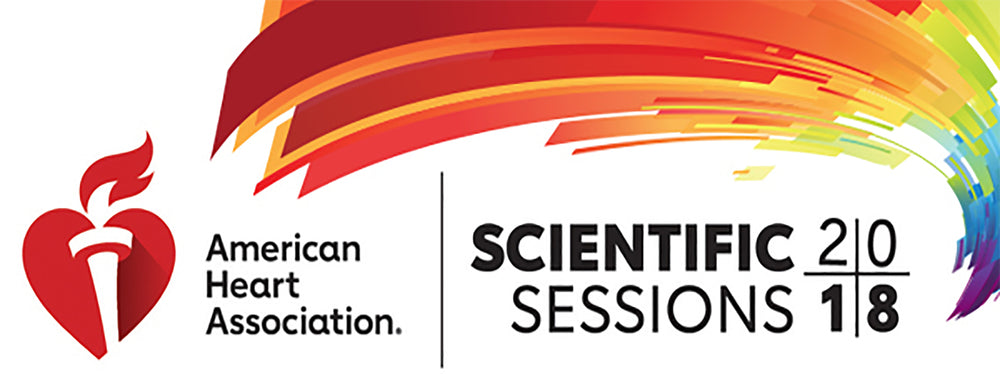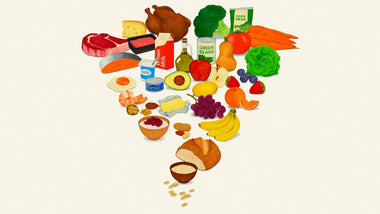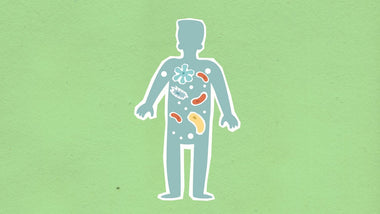Step One Foods Clinical Trial Paper: American Heart Association

Today Step One Foods is presenting its exciting clinical trial findings at American Heart Association’s Scientific Sessions in Chicago - and I can finally share those results with you!
The Effort in Context
It took 5 years to get to this point. Not because we had to enroll so many participants or because participants had to eat the foods for an extended period of time, but because trials in human subjects, appropriately, are highly regulated and require lots of time-intensive oversight. They’re also very expensive to do and finding funding for a study that yields no patentable data is exceedingly challenging. However, at Step One, we would not be deterred! And, as a result, today we can say objectively that our approach WORKS.
What We Did
Our study was composed of two four-week “phases” with a rest period in between. For each phase, 54 participants received a box containing foods packaged in single-serve pouches, together with instructions to consume two servings per day as a substitute for something they were eating already. They were also asked not to change anything else in their daily routines or diets. Cholesterol levels were measured with a blood test before and after each phase. All of the participants were candidates for statin medications, but none were taking the drugs at the time of the study.
In one of the phases, study participants were given an assortment of all Step One Foods– ranging from our bars to our smoothie mix. They could eat whatever combination they wanted. In the other phase, they were provided with “control products” consisting of calorie-matched and type-matched “heart healthy” like-items (again ranging from bars to smoothie mix) found in a typical grocery store. Each participant was randomly assigned to start with either Step One foods or the control set. Because all the products were re-packaged into plain pouches, neither the participants nor the investigators knew which set of foods were being tested in either phase until after the results of all the blood tests were in.
What We Found
First of all, we found that study participants really liked our foods! On feedback regarding taste, Step One rated as far superior to the control items.
Second, on average, across all participants, we saw a 9% reduction in LDL (bad) cholesterol with Step One Foods, and no change (or a slight increase) with the control items. HDL (good) cholesterol went up slightly, blood sugar fell slightly with Step One, but these changes did not reach statistical significance (nor did we expect them to, given the short duration of the phases).
Third, not everyone had a positive response. About 2/3rds of people achieved clinically meaningful cholesterol reductions. This is actually similar to what is seen with most drug trials – about 1/3 of people don’t respond or even have an opposite response to a medication being tested. But what’s different about a drug non-response is that all you’re left with are potential side effects. With Step One, even if you don’t have a cholesterol response, all you get are potential side benefits (like weight loss, blood pressure improvement, better blood sugar control, etc.) over time.
Fourth, if you just look at the 2/3rds that did see cholesterol lowering, their responses were pretty spectacular. Many achieved 20, 30 even close to 40% LDL drops, in just 4 weeks! These numbers are in the range of what we’d hope for with statin medications. In fact, after we saw these results, one of the principal investigators said “If you can achieve this with food, why would you ever use a drug?”
Finally, we found that there are genetic markers that might identify individuals that would be expected to experience cholesterol reductions with our foods!
Why All of this is Important
- We achieved highly statistically significant cholesterol-lowering results with Step One, even though the number of participants was small and the duration of the food intervention was short. What this tells us is that Step One Foods is a powerful intervention.
- Our findings have significant public health implications because for every 1% reduction in LDL, the risk of heart disease has been shown (consistently, in other studies) to decrease by 1%. What this means is that if we had everyone in the country eat our foods, Step One could reduce the risk of heart attack and stroke in the US by 9%, finally dethroning heart disease as the number one killer of Americans.
- Our findings are unique in that the 9% reduction was achieved in a real-world setting. Typical diet intervention trials occur in highly controlled environments where investigators literally watch people eat to make sure they consumed the foods being tested. And everything else that participants consume is specified. In our trial, we let people live their lives – and still managed to get a huge cholesterol result.
- The drug-level LDL reductions seen in some participants have real, practical applications. There are many individuals who can’t tolerate statins or have LDL numbers that are still too high despite being on maximum statin doses. Step One Foods can be a side-effect free, credible solution for many of these individuals.
- Finally, the discovery that certain genetic markers might identify individuals who are likely to experience significant cholesterol lowering with our foods suggests that Step One Foods fits right in with the idea of “personalized medicine”. Given availability and cost issues, it may not be practical to use genetic testing for this purpose today. However and luckily, it only takes a month of eating foods that are good for you to determine if you are a “food-responder” (for cholesterol lowering).
Our Perspective
We collaborated with exceptional investigators from top-ranked academic institutions and proved our approach works in the real world. To the best of our knowledge, we are the first to prove out the concept of “food as medicine”, interpreted literally as a twice per day eating system, backed by genetic data. We could not be prouder of what we were able to accomplish with this clinical trial and are thrilled that we have the opportunity to share our findings with the thousands of clinicians attending the American Heart Association conference.
As always, we don’t pretend we are the only solution or that we are the whole solution. But we do represent the start of a new approach to how we manage chronic health conditions. Where diet is not an afterthought but a central consideration in care - and where patients can have a much more active role in helping themselves heal.
Elizabeth Klodas MD, FACC
Read more about the journey to the clinical trial in these blog posts:
- Step One Clinical Trial Results
- Step One Achieves a Major Milestone
- Clinical Trials and Tribulations

Tested & Proven Results.
- Cardiologist formulated
- Supported by over 500 publications
- Clinically-proven, in a double-blind randomized trial with Mayo Clinic and The University of Manitoba
80% of participants lowered their cholesterol in just 30 days. With just two servings per day, Step One Foods offers a proven-effective way to naturally lower LDL (bad) cholesterol.
Get heart health tips and articles like this, delivered right to your email.
New articles every week.
You may also like...

The Heart of the Matter: The Engine That Makes Whole-Body Health Possible

The New Food Pyramid: What It Gets Right (and What It Misses)

You don’t need to avoid foods with cholesterol…except for these


